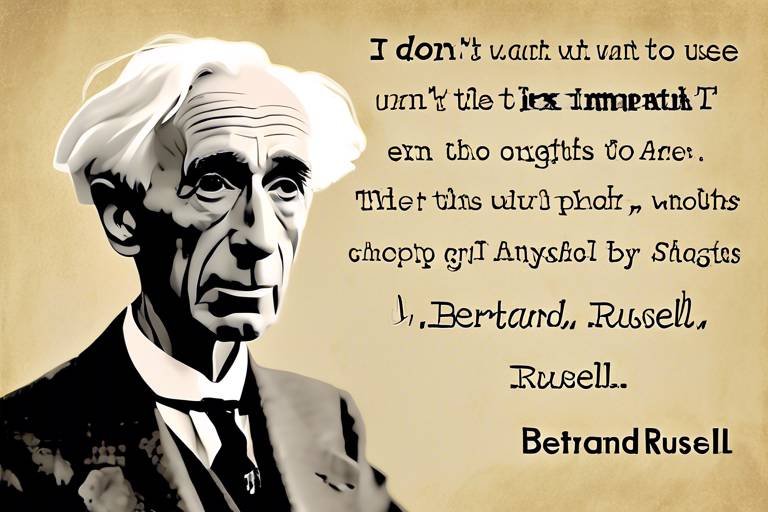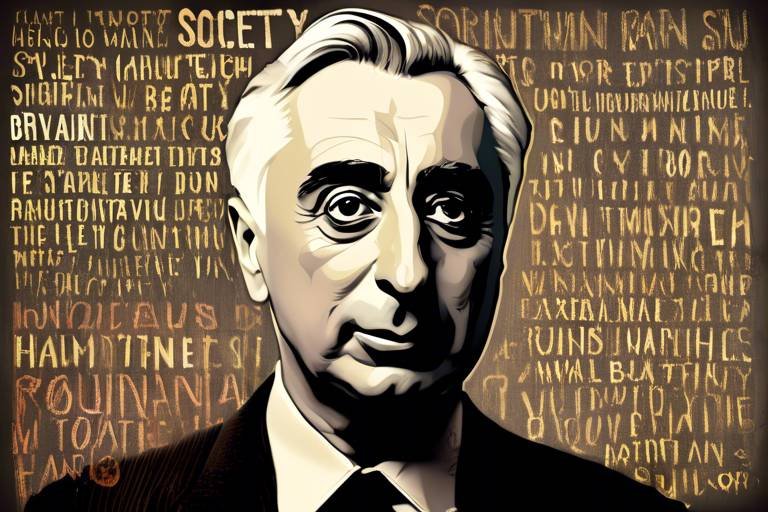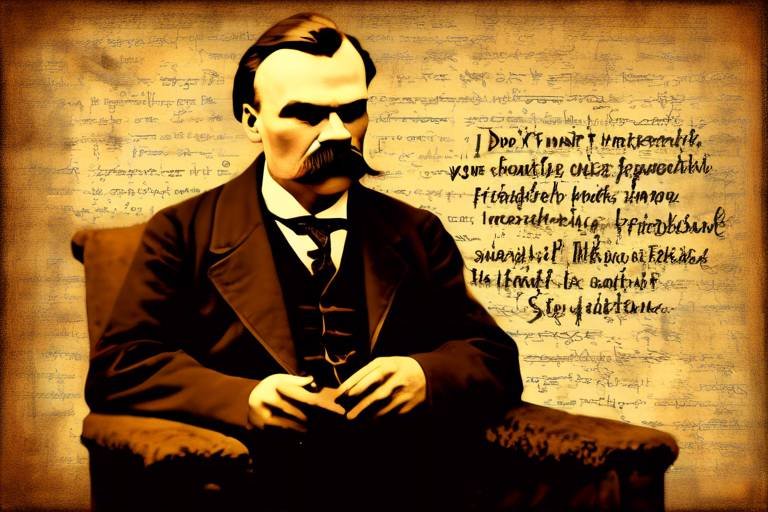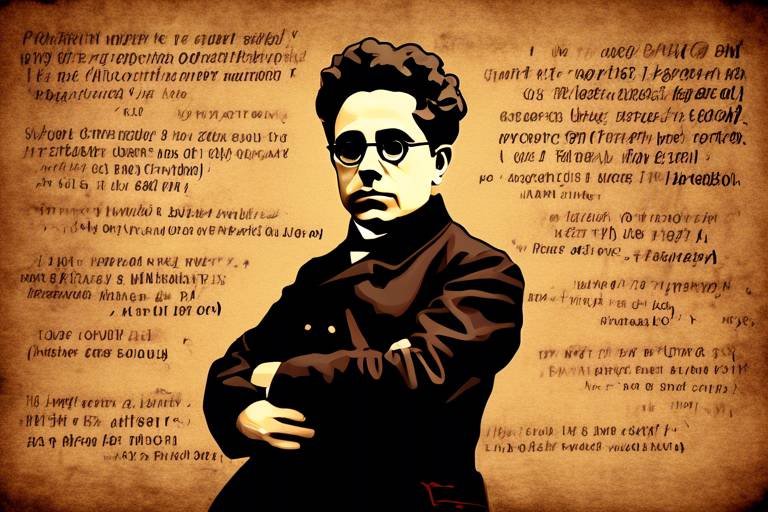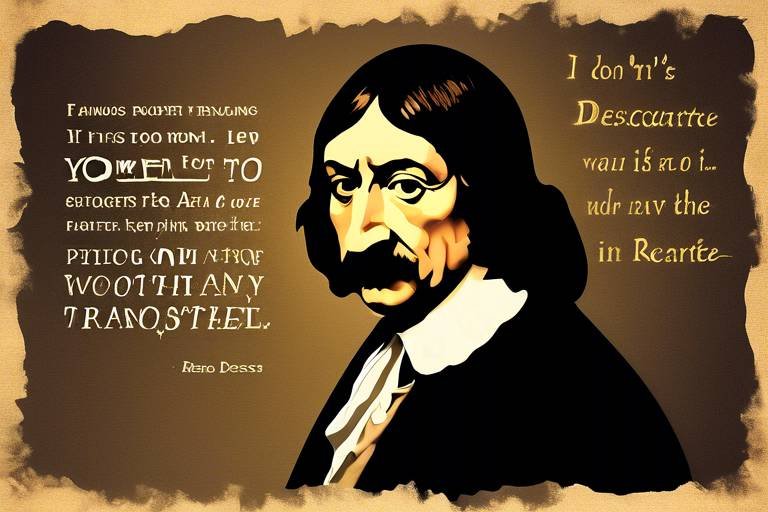Philosophical Thoughts by Bertrand Russell - An Analysis
This article delves into the profound philosophical insights of Bertrand Russell, exploring his contributions to logic, ethics, and social philosophy, while reflecting on their relevance in contemporary thought.
Bertrand Russell, a towering figure in 20th-century philosophy, embarked on a journey that would not only reshape the landscape of philosophical inquiry but also challenge the very foundations of human thought. Born in 1872, Russell's early life was steeped in the traditions of British empiricism, heavily influenced by the likes of John Stuart Mill and David Hume. His philosophical journey is marked by a relentless pursuit of clarity and truth, often questioning established norms and beliefs.
Russell's work spans a variety of topics, but at the heart of his philosophy lies a commitment to critical thinking and rational inquiry. He believed that philosophy should not only be an abstract discipline but also a practical tool for understanding and improving the world. This perspective is particularly significant today, as we navigate an era rife with misinformation and dogma. Russell's insistence on the importance of logic and reason resonates more than ever, urging us to question the status quo and seek knowledge through evidence and reasoned argument.
One of Russell's most significant contributions to philosophy is his work in mathematical logic. He believed that logic was the bedrock of all philosophical inquiry, providing a clear framework for understanding complex ideas. His efforts to establish a rigorous foundation for logical analysis have had profound implications for epistemology, the study of knowledge itself.
In collaboration with Alfred North Whitehead, Russell co-authored the monumental work Principia Mathematica, published between 1910 and 1913. This work aimed to derive all mathematical truths from a well-defined set of axioms and inference rules. The impact of Principia Mathematica on logic and mathematics cannot be overstated; it revolutionized the way philosophers and mathematicians approached the subject. By demonstrating that mathematics could be grounded in logical principles, Russell and Whitehead paved the way for future developments in both fields.
Another key concept introduced by Russell is logical atomism. This theory posits that the world consists of independent facts, much like atoms in a physical sense. Each fact is a simple, indivisible entity that can be combined to form more complex propositions. This idea not only influenced later philosophical movements but also provided a framework for understanding the relationship between language and reality. By breaking down complex statements into their simplest components, Russell sought to clarify philosophical discourse and eliminate confusion.
Russell's views on the relationship between language and reality are equally compelling. He argued that language serves as a bridge between our thoughts and the external world, shaping our understanding of reality. His theories contributed significantly to the development of analytic philosophy, emphasizing the importance of clarity in language to avoid philosophical muddles. Russell believed that many philosophical problems arise from misunderstandings of language, and by addressing these issues, we can achieve greater clarity in our thinking.
Russell's ethical theories are equally thought-provoking. He was a vocal advocate of utilitarianism, which posits that the best action is the one that maximizes overall happiness. However, he also recognized the limitations of this approach, particularly in its application to complex social issues. His commitment to pacifism during World War I and his advocacy for social justice reflect his belief in the moral responsibility of individuals to promote the greater good.
Russell's critical stance on religion is perhaps one of his most controversial positions. He argued against dogma and emphasized the importance of secularism and rational inquiry. For Russell, religion often served as a barrier to critical thinking and progress, leading individuals to accept beliefs without question.
In his famous works, Russell critiqued religious beliefs, focusing on the implications of faith, morality, and the existence of God. He argued that morality should not be grounded in religious doctrine but rather in human experience and reason. This perspective challenges traditional views and encourages a more nuanced understanding of ethics in a secular context.
Russell's thoughts on education highlight its role in fostering critical thinking, individuality, and social responsibility. He believed that education should not merely transmit knowledge but also cultivate the ability to think independently and question authority. This vision of education remains relevant today, as we strive to create learning environments that empower students to engage with the world thoughtfully and critically.
Reflecting on Bertrand Russell's enduring legacy reveals a profound impact on philosophy, education, and social activism. His commitment to reason, clarity, and social justice continues to inspire contemporary philosophical discourse and public thought. As we navigate the complexities of modern life, Russell's insights serve as a guiding light, reminding us of the power of critical thinking and the importance of questioning our beliefs.
- What is Bertrand Russell best known for?
Russell is best known for his contributions to logic, philosophy of language, and his advocacy for social justice and pacifism. - How did Russell influence modern philosophy?
Russell's work laid the groundwork for analytic philosophy and emphasized the importance of logic and clarity in philosophical discourse. - What were Russell's views on religion?
Russell was critical of organized religion, advocating for secularism and rational inquiry over dogma. - What is logical atomism?
Logical atomism is the idea that the world consists of independent facts, similar to atoms, which can be combined to form complex propositions.

Introduction to Bertrand Russell's Philosophy
Bertrand Russell, a towering figure in 20th-century philosophy, is often celebrated for his remarkable ability to bridge the gap between complex logical theories and everyday understanding. His philosophical journey was not just a personal exploration; it was a quest to unravel the mysteries of existence, knowledge, and ethics in a world that often seems chaotic and nonsensical. Born in 1872 in Trellech, Wales, Russell was influenced by a myriad of thinkers, from the empiricism of David Hume to the logical rigor of Gottlob Frege. His early exposure to mathematics and logic laid the groundwork for his later contributions, which would fundamentally reshape the landscape of modern philosophy.
Russell's work can be categorized into several key areas, each reflecting his commitment to clarity and rationality. He was a staunch advocate of logical analysis, believing that many philosophical problems arise from misunderstandings of language and logic. His famous assertion that "the map is not the territory" serves as a reminder that our perceptions and descriptions of the world are not the same as the reality they aim to represent. This perspective is crucial when considering his impact on analytic philosophy, which emphasizes the use of formal logic to clarify philosophical problems.
In addition to his contributions to logic, Russell's ethical theories challenge conventional moral thinking. He was a vocal proponent of utilitarianism, advocating for actions that maximize happiness and reduce suffering. However, he also recognized the limitations of this approach, particularly in the context of social justice and individual rights. His pacifism during World War I, for instance, showcased his deep commitment to ethical principles over popular sentiment, a stance that often put him at odds with contemporary society.
Russell's philosophical ideas were not confined to academic discourse; he was also a passionate social activist. He believed that philosophy should engage with the pressing issues of the day, such as war, education, and religion. His critiques of dogmatic beliefs and his advocacy for secularism highlight his belief in the importance of rational inquiry and skepticism. In essence, Russell's philosophy is a call to question, to analyze, and to engage with the world around us.
As we explore the various facets of Russell's thought throughout this article, it becomes evident that his work remains profoundly relevant today. In an era marked by misinformation and polarized beliefs, Russell's insistence on clarity, logic, and ethical responsibility offers a guiding light for both philosophers and laypeople alike.

The Role of Logic in Russell's Thought
When we think about the philosophy of the 20th century, it’s hard to ignore the towering figure of Bertrand Russell. His contributions to logic were not just academic exercises; they were revolutionary, reshaping the very foundation of philosophical inquiry. Russell believed that logic was the bedrock of all philosophical thought, a tool that could cut through the confusion and ambiguity often found in human reasoning. His work in mathematical logic, particularly through his seminal texts, laid the groundwork for modern logic and influenced countless philosophers and logicians who followed.
Russell's journey into the realm of logic began with a quest for clarity. He sought to establish a rigorous framework that could analyze and clarify philosophical problems. This pursuit culminated in his groundbreaking collaboration with Alfred North Whitehead on the monumental work Principia Mathematica. This text aimed to demonstrate that all mathematical truths could be derived from a set of axioms through logical deduction. Imagine a vast landscape of mathematical concepts, and Principia Mathematica as a map that guides us through it, showing us how to navigate the complexities with precision.
In Principia Mathematica, Russell and Whitehead tackled the challenge of formalizing mathematics using logical principles. They introduced a system where mathematical statements could be expressed in logical form, thereby revealing the underlying structures that govern mathematical truths. This work was not merely theoretical; it had profound implications for the fields of mathematics and philosophy alike. By establishing a logical foundation for mathematics, Russell opened the door to a new way of understanding not just numbers, but the very nature of truth itself.
One of the most intriguing aspects of Russell's philosophy is his concept of logical atomism. This idea posits that the world is made up of independent facts, much like atoms in a physical sense. Each fact is a distinct entity that can be analyzed and understood on its own. This perspective suggests that by breaking down complex propositions into their simplest components, we can gain clearer insights into reality. Picture a jigsaw puzzle: by examining each piece individually, we can better understand how they fit together to form the complete picture of our world.
Russell also emphasized the critical relationship between language and reality. He argued that many philosophical problems arise from misunderstandings of language itself. By analyzing the structure of language, he believed we could clarify our thoughts and resolve philosophical dilemmas. His theories on descriptions and reference have been particularly influential, providing tools for dissecting how we communicate ideas about the world. Just as a map can mislead if not interpreted correctly, so too can language obscure the truth if we fail to analyze it properly.
Through his rigorous approach to logic, Russell not only transformed the landscape of philosophy but also provided a framework for critical thinking that remains relevant today. His insistence on clarity and precision in thought encourages us to question our assumptions and strive for a deeper understanding of the world around us.
- What is the significance of Bertrand Russell's work in logic?
Russell's work laid the groundwork for modern logic and analytic philosophy, influencing various fields beyond philosophy, including mathematics and computer science. - How did logical atomism impact later philosophical movements?
Logical atomism influenced movements such as logical positivism and analytic philosophy, promoting the idea that language and reality are closely linked. - What are some key texts by Bertrand Russell?
Key texts include Principia Mathematica, The Problems of Philosophy, and Human Knowledge: Its Scope and Limits.

Principia Mathematica
, co-authored by Bertrand Russell and Alfred North Whitehead, is a monumental work that has left an indelible mark on the landscape of logic and mathematics. Published between 1910 and 1913, this three-volume masterpiece aimed to provide a solid foundation for all of mathematics through the lens of formal logic. At its core, sought to demonstrate that mathematics could be derived from logical axioms, a revolutionary idea that challenged the prevailing notions of its time.
One of the most fascinating aspects of is its intricate structure and the rigorous methodology employed by its authors. The work is not just a collection of mathematical theories; rather, it is a carefully constructed argument that unfolds progressively. The authors meticulously define each concept and construct their logical framework step by step, making it accessible yet profoundly challenging. Readers are often left in awe of the sheer complexity and depth of thought that went into its creation.
The significance of extends beyond its immediate mathematical contributions. It played a crucial role in the development of modern logic, influencing numerous fields such as computer science, linguistics, and even philosophy. The book introduced several key concepts, including:
- Logical Constants: Russell and Whitehead introduced symbols to represent logical operations, which laid the groundwork for symbolic logic.
- Type Theory: This concept was developed to avoid paradoxes in set theory, providing a framework for understanding the relationships between different types of entities.
- Formal Proofs: The rigorous approach to proofs established a standard that many subsequent mathematicians and logicians would adopt.
The impact of can be seen in the way it redefined the relationship between logic and mathematics. It argued that logical truths are the foundation upon which mathematical truths can be built. This idea resonated with many thinkers and led to a greater appreciation for the role of logic in philosophical inquiry. In essence, Russell and Whitehead were not merely interested in mathematics; they sought to understand the very nature of truth and knowledge itself.
However, the work is not without its criticisms. Some scholars argue that its complexity makes it less accessible to those outside the fields of mathematics and philosophy. Despite this, the book remains a cornerstone of analytical philosophy and continues to be studied and revered. Its legacy is evident in the way it has shaped discussions around the foundations of mathematics and the philosophy of language.
In conclusion, represents a significant milestone in the history of philosophy and mathematics. Its ambitious goal of unifying logic and mathematics has inspired generations of thinkers and continues to provoke thought and debate in contemporary philosophical discourse. Russell's vision of a logical foundation for mathematics not only transformed the field but also opened new avenues for exploring the nature of reality, knowledge, and existence itself.
- What is the main goal of Principia Mathematica?
The main goal is to demonstrate that all of mathematics can be derived from logical axioms. - Who were the authors of Principia Mathematica?
Bertrand Russell and Alfred North Whitehead co-authored this seminal work. - What impact did Principia Mathematica have on modern philosophy?
It significantly influenced the development of modern logic and analytic philosophy.

Principia Mathematica
is a monumental work co-authored by Bertrand Russell and Alfred North Whitehead, first published between 1910 and 1913. This groundbreaking text aimed to establish a solid foundation for all of mathematics through the lens of formal logic. Imagine trying to build a skyscraper; without a strong foundation, the entire structure is at risk. Russell and Whitehead sought to provide that foundation for mathematics, ensuring that every mathematical truth could be derived from a set of axioms using logical deduction.
The significance of cannot be overstated. It was not just a book about mathematics; it was a radical rethinking of the very nature of logic and its relationship to mathematical truths. The authors introduced a new way of thinking about numbers, functions, and relations, which influenced the realms of mathematics and philosophy alike. They meticulously defined concepts such as sets and classes, which are fundamental to modern mathematics. This was akin to laying down the tracks for a train; without these definitions, the journey of mathematical exploration would have been chaotic and undefined.
One of the most intriguing aspects of is its use of symbolic logic. By employing a formal language, Russell and Whitehead aimed to eliminate ambiguity and clarify the relationships between different mathematical entities. This approach not only revolutionized mathematics but also paved the way for the development of computer science and artificial intelligence. It’s fascinating to think that the very principles that guide our digital world today have roots in the pages of this seminal work.
However, the journey through is not without its challenges. The text is notoriously complex, filled with intricate symbols and dense arguments that can be daunting for even the most seasoned philosophers and mathematicians. Yet, those who persevere are rewarded with profound insights into the nature of truth and the structure of logical reasoning. It's like trying to decode a secret language; once you grasp it, the world of logic opens up in ways you never imagined.
In summary, stands as a testament to the intellectual prowess of Russell and Whitehead. It not only transformed the landscape of mathematics but also set the stage for future philosophical inquiries into the nature of knowledge and reality. This work continues to inspire scholars and students, inviting them to explore the depths of logic and its implications for understanding the universe. As we delve deeper into the complexities of life and thought, the foundations laid by Russell and Whitehead remind us that every great edifice of knowledge must rest on solid ground.
- What is the main goal of Principia Mathematica? The primary goal is to provide a logical foundation for all of mathematics, showing that mathematical truths can be derived from a set of axioms using formal logic.
- Who were the authors of Principia Mathematica? The book was co-authored by Bertrand Russell and Alfred North Whitehead.
- Why is Principia Mathematica considered difficult to read? The text is filled with complex symbols and dense arguments, making it challenging for readers to navigate.
- How did Principia Mathematica influence modern philosophy? It revolutionized the understanding of logic and mathematics, influencing not only philosophy but also fields like computer science.

on logic and mathematics.
Bertrand Russell, a towering figure in 20th-century philosophy, has left an indelible mark on various fields including logic, ethics, and social philosophy. His work not only reshaped modern philosophical thought but also offered a lens through which we can scrutinize our understanding of reality. Russell was influenced by a diverse range of thinkers, from the rigorous logic of Frege to the ethical considerations of Mill. His ability to synthesize these ideas into coherent philosophical arguments has made him a pivotal figure in the evolution of critical thinking.
Russell's contributions to mathematical logic are nothing short of revolutionary. He sought to establish a robust foundation for logical analysis, fundamentally altering the landscape of philosophy. By emphasizing the importance of logic, he argued that clarity in thought leads to clarity in language and, ultimately, in understanding the world around us. His work paved the way for the development of epistemology, the study of knowledge, and how we come to know what we know.
One of Russell's most significant collaborations was with Alfred North Whitehead on the monumental work, Principia Mathematica. This groundbreaking text aimed to derive all mathematical truths from a well-defined set of axioms and inference rules. The ambition behind Principia Mathematica was to show that mathematics could be grounded in logic, thereby asserting that mathematical truths are not merely arbitrary but can be systematically derived. The impact of this work on both logic and mathematics has been profound, influencing generations of mathematicians and philosophers alike.
Russell's concept of logical atomism further illustrates his approach to philosophy. He posited that the world consists of independent facts, much like atoms that combine to form complex structures. This perspective suggests that by analyzing these basic facts, we can construct a clearer understanding of the world. Logical atomism not only influenced Russell's contemporaries but also laid the groundwork for later philosophical movements, including logical positivism.
Another significant aspect of Russell's philosophy is his analysis of language. He believed that language plays a crucial role in shaping our understanding of reality. By examining the relationship between language and the world, he contributed to the development of analytic philosophy. Russell's theories suggested that many philosophical problems arise from misunderstandings of language, leading him to advocate for precision in both thought and expression. His belief that ordinary language could be dissected to reveal deeper truths has resonated through various fields, including linguistics and cognitive science.
While Russell's work in logic and mathematics is widely recognized, his contributions to ethical theory are equally significant. He explored various ethical frameworks, including utilitarianism and pacifism, advocating for a moral philosophy rooted in social justice and individual rights. Russell's commitment to ethics was not just theoretical; it was deeply intertwined with his activism, as he sought to apply philosophical principles to real-world issues.
Russell's critical stance on religion is well-documented, as he argued against dogma and championed secularism. His advocacy for rational inquiry over blind faith has sparked debates that continue to this day.
In his critiques of religious beliefs, Russell questioned the foundations of faith, morality, and the existence of God. His arguments often highlighted the conflict between scientific reasoning and religious dogma, advocating for a worldview grounded in evidence and reason.
Russell believed that education should foster critical thinking, individuality, and social responsibility. He viewed education as a means to empower individuals to question the status quo and engage thoughtfully with the world around them.
Reflecting on Bertrand Russell's enduring legacy, we see a philosopher whose ideas continue to shape contemporary thought. His work in philosophy, education, and social activism remains influential, inspiring new generations to think critically and act justly.
- What is Bertrand Russell known for?
Bertrand Russell is known for his significant contributions to logic, philosophy, and social activism, particularly in the areas of mathematical logic and ethical theory.
- How did Russell influence modern philosophy?
Russell's emphasis on logical analysis and clarity of thought has profoundly influenced modern philosophical discourse, paving the way for movements like analytic philosophy.
- What is logical atomism?
Logical atomism is the idea that the world consists of independent facts, which can be analyzed to understand the structure of reality.
- What were Russell's views on religion?
Russell was critical of religion, advocating for secularism and rational inquiry over dogmatic beliefs.

Logical Atomism
Bertrand Russell's concept of is a fascinating philosophical perspective that seeks to break down the complexities of the world into simpler, more fundamental components. Imagine the universe as a vast puzzle; logical atomism proposes that each piece of the puzzle is an independent fact that can be analyzed and understood in isolation. This idea stems from Russell's belief that the world is composed of discrete entities, or "atoms," of meaning that correspond to the facts we observe.
At its core, logical atomism asserts that the structure of language mirrors the structure of reality. Russell argued that by understanding the logical form of propositions, we can gain insight into the nature of the world itself. In this sense, he posited that language serves as a tool for dissecting and comprehending the world around us. This is not merely an abstract exercise; it has profound implications for how we engage with knowledge and truth.
Russell's approach was revolutionary because it challenged the prevailing notions of metaphysics at the time, which often relied on complex theories that obscured the clarity of thought. By advocating for a method that emphasizes simplicity and clarity, Russell laid the groundwork for what would later become the movement known as analytic philosophy. This movement prioritizes logical analysis and the use of language as a means to clarify philosophical problems.
One of the key aspects of logical atomism is its focus on independence. Each fact, or "atom," is seen as standing alone, unaffected by other facts. This perspective encourages a form of analysis where philosophers can dissect propositions into their elemental parts. For instance, consider the statement "The cat is on the mat." According to logical atomism, we can break this down into simpler elements: "There is a cat," "There is a mat," and "The cat is in a particular relation to the mat." This reductionist approach allows for a clearer understanding of the relationships between concepts.
Russell's logical atomism also paved the way for later philosophical discussions, particularly those concerning the nature of truth and reality. By positing that the world consists of independent facts, he opened the door for subsequent philosophers to explore how these facts interrelate and contribute to a larger understanding of existence. This has led to a rich tapestry of philosophical inquiry that continues to resonate today.
In conclusion, logical atomism is not just an abstract philosophical theory; it is a practical framework that has influenced various fields, including linguistics, logic, and even computer science. By emphasizing the importance of clarity, independence, and logical structure, Russell's ideas have left an indelible mark on modern thought, encouraging us to approach complex problems with a mindset that values simplicity and precision.
- What is logical atomism? Logical atomism is a philosophical theory proposed by Bertrand Russell that suggests the world consists of independent facts that can be analyzed and understood individually.
- How did logical atomism influence modern philosophy? It laid the groundwork for analytic philosophy, emphasizing clarity and the logical structure of language as a means to understand reality.
- What are the implications of logical atomism? It encourages a reductionist approach to philosophical problems, allowing for clearer insights into the relationships between concepts and facts.

Analysis of Language
Bertrand Russell's exploration of language is nothing short of revolutionary. He believed that language is not merely a tool for communication but a fundamental component that shapes our perception of reality. To Russell, the way we articulate our thoughts influences our understanding of the world around us. This idea is crucial because it suggests that language is intertwined with our cognitive processes, affecting how we think and interact with our environment.
One of Russell's significant contributions to the analysis of language is his distinction between descriptive and prescriptive uses of language. Descriptive language aims to convey facts about the world, while prescriptive language attempts to influence how we ought to act. This distinction is vital in philosophy because it highlights the complexity of language and its implications for truth and meaning. For instance, when we say, "The sky is blue," we are making a descriptive statement. However, when we say, "You should be kind," we are engaging in a prescriptive act that seeks to guide behavior.
Russell also introduced the concept of definite descriptions, which refers to phrases like "the current king of France." He argued that such expressions can lead to confusion and ambiguity in philosophical discourse. This notion is essential because it underscores the importance of clarity in language. When we use vague or unclear terms, we risk miscommunication and misunderstanding. Russell's analysis encourages us to be precise in our language to convey our thoughts effectively.
Furthermore, Russell's work paved the way for the development of analytic philosophy, which emphasizes clarity and logical rigor in philosophical arguments. This movement has had a profound impact on contemporary philosophy, guiding thinkers to focus on the structure of arguments and the use of language as a means to achieve clarity. By scrutinizing the relationship between language and reality, Russell helped establish a framework that many philosophers still use today.
In addition to his philosophical contributions, Russell's insights into language have practical implications. For example, in the realm of education, understanding the nuances of language can foster critical thinking skills in students. When individuals learn to analyze language critically, they become more adept at dissecting arguments, recognizing biases, and engaging in meaningful discourse. This skill set is invaluable in today's information-rich society, where the ability to navigate complex language is essential.
In summary, Bertrand Russell's analysis of language reveals its intricate relationship with thought and reality. By distinguishing between different uses of language and advocating for clarity, he has influenced not only philosophy but also education and communication. His legacy continues to resonate, reminding us of the power of words and the importance of thoughtful expression.
- What is Bertrand Russell known for?
Bertrand Russell is known for his contributions to logic, philosophy, and social activism. He is particularly recognized for his work in mathematical logic and his critiques of religion. - How did Russell influence modern philosophy?
Russell's emphasis on clarity and logical analysis laid the groundwork for analytic philosophy, shaping contemporary philosophical discourse. - What is logical atomism?
Logical atomism is a philosophy proposed by Russell, suggesting that the world is made up of independent facts that can be analyzed logically. - Why is the analysis of language important?
The analysis of language is crucial because it helps clarify our thoughts, improves communication, and enhances critical thinking skills.

Ethics and Moral Philosophy
Bertrand Russell’s exploration of ethics and moral philosophy is nothing short of revolutionary. He believed that ethics should not be a mere abstract exercise but rather a practical guide to living a fulfilling and just life. Russell’s perspective can be seen as a bridge between traditional moral theories and modern ethical dilemmas, encouraging us to think critically about our values and actions. He was particularly influenced by the utilitarian tradition, which emphasizes the greatest happiness for the greatest number, but he also introduced his own nuanced views that challenge simplistic interpretations of this principle.
One of the most compelling aspects of Russell's ethical philosophy is his commitment to pacifism. He argued that violence is not a solution to conflict and that moral progress can only be achieved through understanding and dialogue. This conviction led him to oppose wars and militaristic policies, even when such stances were unpopular. His pacifism was not just a personal belief; it was a call to action for society to embrace peace and rational discourse over aggression. In his view, true morality must transcend mere compliance with societal norms and instead foster a deeper sense of compassion and responsibility towards others.
Russell also delved into the implications of social justice within his ethical framework. He believed that moral philosophy must address the systemic inequalities present in society. To him, the pursuit of justice was intertwined with the pursuit of knowledge and reason. He argued that a just society is one where individuals are free to think critically, express themselves, and contribute to the collective well-being. This perspective is particularly relevant today, as we grapple with issues of inequality, discrimination, and the ethical responsibilities of individuals and institutions.
To illustrate his ethical theories, consider the following table that summarizes some of Russell's key ethical principles:
| Principle | Description |
|---|---|
| Utilitarianism | The greatest happiness for the greatest number is the ultimate moral goal. |
| Pacifism | Opposition to violence and war as means of resolving conflicts. |
| Social Justice | Advocating for equality and fairness in society, challenging systemic injustices. |
Russell's ethical thought also emphasizes the importance of individual autonomy. He believed that each person should have the freedom to pursue their own happiness, provided this does not infringe on the rights of others. This idea resonates with contemporary discussions around personal freedoms and the role of government in regulating behavior. Russell's insistence on rational inquiry as a basis for ethical decision-making encourages individuals to question societal norms and strive for a more humane world.
In summary, Bertrand Russell’s contributions to ethics and moral philosophy are not only profound but also incredibly relevant to our modern context. His advocacy for pacifism, social justice, and individual autonomy challenges us to rethink our moral frameworks and consider the broader implications of our actions. As we navigate complex moral landscapes today, Russell's insights serve as a guiding light, urging us to prioritize reason, compassion, and justice in our ethical considerations.
- What is Bertrand Russell's main contribution to ethics? Russell emphasized the importance of utilitarianism, pacifism, and social justice in his moral philosophy.
- How did Russell view the relationship between ethics and individual freedom? He believed that individual autonomy is crucial, as long as it does not infringe on the rights of others.
- What role did pacifism play in Russell's philosophy? Pacifism was central to his ethical thought, advocating for non-violent resolutions to conflicts.

Russell's Views on Religion
Bertrand Russell, a towering figure in modern philosophy, held a critical stance towards religion that has sparked much debate and discussion. His views were not merely dismissive; rather, they were grounded in a profound commitment to reason and empirical evidence. Russell believed that religion often stands in the way of genuine understanding and progress, advocating instead for a worldview shaped by rational inquiry and skepticism. He argued that many religious beliefs are based on dogma rather than evidence, leading to a conflict between faith and reason.
One of Russell's most notable contributions to the discourse on religion is his critique of theism. He famously stated, "The existence of God is not a subject that can be settled by mere assertion." This highlights his belief that faith should not be accepted without rigorous questioning and that the burden of proof lies with those who make extraordinary claims. In his essay "Why I Am Not a Christian," Russell meticulously dismantles the arguments for the existence of God, emphasizing the lack of empirical evidence and the logical inconsistencies within religious doctrines.
Moreover, Russell was a staunch advocate of secularism. He believed that a secular society, free from religious influence, would be more conducive to peace and social progress. In his view, religion often fosters division and conflict, as evidenced by historical and contemporary wars fought in the name of God. He posited that moral values should be derived from human experiences and rational thought rather than divine commandments, arguing that ethics could exist independently of religious belief.
Russell's critique extended beyond the existence of God to encompass the moral implications of religious beliefs. He questioned the morality of doctrines that promote suffering or punishment, particularly in relation to concepts like hell and sin. He argued that such beliefs can lead to psychological harm and social injustice, as they often instill fear rather than fostering a genuine sense of morality. In contrast, Russell advocated for a moral framework based on empathy, understanding, and the well-being of individuals and society as a whole.
In addition to his critiques, Russell also recognized the cultural and historical significance of religion. He understood that religion has played a vital role in shaping human civilization, influencing art, literature, and philosophy throughout the ages. However, he maintained that while religion may have historical importance, it should not dictate contemporary thought or policy. He urged society to embrace a more scientific and rational approach to understanding the world, one that prioritizes evidence and critical thinking over tradition and dogma.
To summarize, Bertrand Russell's views on religion are characterized by a profound skepticism and a commitment to rational inquiry. He challenged the validity of religious beliefs and argued for a secular moral framework that prioritizes human well-being. His legacy continues to inspire those who seek to question dogma and embrace a more reasoned approach to understanding existence.
- What did Bertrand Russell think about religion? Russell was critical of religion, advocating for rational inquiry and skepticism over faith.
- Did Russell believe in God? No, Russell did not believe in God and argued against the existence of a deity based on a lack of evidence.
- What was Russell's stance on morality? He believed that morality should be based on human experiences and empathy rather than religious doctrines.
- How did Russell view secularism? Russell saw secularism as essential for social progress and believed it could lead to a more peaceful society.

Critique of Religion
Bertrand Russell, a towering figure in modern philosophy, was not one to shy away from challenging established norms, especially when it came to religion. His critique of religion is both profound and multifaceted, addressing the very foundations upon which religious beliefs stand. Russell's skepticism was not merely a rejection of faith; rather, it was a call for rational inquiry, urging individuals to question dogmas that often go unexamined. He believed that many religious doctrines are built on shaky grounds, lacking empirical support and rational justification.
One of Russell's most notable arguments against religion is his assertion that faith often substitutes for reason. He famously stated, "Faith is the great cop-out, the great excuse to evade the need to think and evaluate evidence." This perspective highlights his belief that unexamined faith can lead to a dangerous complacency, where individuals accept beliefs without scrutiny. Russell argued that this blind acceptance not only stifles intellectual growth but can also lead to societal harm, as seen in historical conflicts fueled by religious fervor.
Moreover, Russell was critical of the moral implications of religious belief. He posited that many religious teachings promote divisive ideologies, fostering an "us vs. them" mentality. In his view, the ethical frameworks provided by religions often prioritize dogma over compassion, which can lead to intolerance and discrimination. He argued that moral values should be derived from human experiences and reason rather than ancient texts. This perspective aligns with his broader advocacy for a secular approach to ethics, one that emphasizes human welfare and social justice.
To illustrate his critique, Russell often engaged with the concept of God, questioning the necessity of a deity in explaining the universe. He famously posed the question, "If God exists, why is there so much evil in the world?" This rhetorical question underscores his belief that the existence of suffering and injustice challenges the traditional notions of an all-powerful, benevolent God. By highlighting the contradictions within religious frameworks, Russell encouraged a more rational understanding of morality that does not rely on supernatural explanations.
In addition to his critiques, Russell also advocated for a secular society where reason and science take precedence over faith. He believed that education plays a crucial role in this transformation, promoting critical thinking and individuality. Russell's vision of education was one that fosters a questioning spirit, empowering individuals to challenge not only religious beliefs but also societal norms that may be unjust or oppressive.
Ultimately, Russell's critique of religion serves as a reminder of the importance of skepticism and rational inquiry in our lives. By questioning established beliefs and advocating for a more secular approach to ethics and morality, he paved the way for a philosophical discourse that prioritizes human experience and reason over dogma. His legacy continues to resonate today, encouraging individuals to engage in thoughtful reflection and to seek understanding through evidence rather than blind faith.
- What were Bertrand Russell's main criticisms of religion?
Russell criticized religion for promoting blind faith over reason, fostering intolerance, and providing insufficient moral guidance based on human experiences. - How did Russell view the relationship between faith and reason?
He believed that faith often acts as a substitute for reason, leading individuals to accept beliefs without critical evaluation. - What impact did Russell's critiques have on contemporary thought?
His critiques encouraged a more secular approach to ethics and morality, influencing modern discussions on the role of religion in society.

Philosophy of Education
Bertrand Russell's philosophy of education is a fascinating exploration of how learning shapes individuals and society. He believed that education should not merely be about the transmission of knowledge, but rather a process that fosters critical thinking, creativity, and individuality. Russell argued that the ultimate goal of education is to develop a sense of responsibility in students, encouraging them to think for themselves and engage with the world around them. This perspective is especially relevant in today's rapidly changing society, where the ability to analyze information critically is more important than ever.
One of Russell's key ideas was the importance of free inquiry. He championed the notion that students should be encouraged to question everything, from established truths to societal norms. This approach not only cultivates a spirit of skepticism but also empowers students to become active participants in their own education. Imagine a classroom where students are not just passive recipients of information, but vibrant thinkers who challenge ideas and seek deeper understanding. This is the essence of Russell's educational philosophy.
Moreover, Russell emphasized the role of imagination in learning. He believed that education should stimulate the imagination, allowing students to envision possibilities beyond their immediate realities. By integrating creative arts and critical discussions into the curriculum, educators can nurture a more holistic learning experience. Russell's vision of education is akin to planting a garden; with the right environment and care, students can flourish and grow into thoughtful, compassionate individuals who contribute positively to society.
In addition to fostering critical thinking and imagination, Russell also highlighted the significance of social responsibility in education. He argued that schools should prepare students not just for careers but for active citizenship. This means instilling values of empathy, justice, and community engagement. Russell believed that education should address the pressing social issues of the time, encouraging students to become aware of and involved in the world around them. By integrating social justice into the curriculum, educators can help students understand their role in shaping a better future.
To summarize, Russell's philosophy of education can be encapsulated in a few key principles:
- Critical Thinking: Encourage questioning and skepticism.
- Imagination: Stimulate creativity and innovative thinking.
- Social Responsibility: Prepare students to engage with societal issues.
In conclusion, Bertrand Russell's insights into education remain profoundly relevant today. His advocacy for a learning environment that nurtures critical thought, creativity, and social responsibility is a call to action for educators everywhere. By embracing these principles, we can cultivate a generation of thinkers who are not only knowledgeable but also compassionate and engaged citizens.
- What is Russell's view on traditional education?
Russell criticized traditional education for being overly rote and not fostering critical thinking. He believed it should encourage inquiry and creativity. - How does Russell's philosophy apply to modern education?
His emphasis on critical thinking and social responsibility is increasingly relevant in today's educational landscape, where these skills are essential for success. - What role does imagination play in education according to Russell?
Russell believed that imagination is crucial for personal development and should be integrated into educational practices to inspire innovative thinking.

Legacy and Influence
Bertrand Russell's legacy is as vast as it is profound, echoing through the corridors of philosophy, education, and social activism. His ability to intertwine logic with ethical considerations has left an indelible mark on contemporary thought. In a world where the complexities of life often lead to confusion, Russell's clarity of thought and expression provides a refreshing lens through which to view our existence. He championed the idea that philosophy should not be a mere academic exercise but rather a tool for critical inquiry and social betterment.
Russell's influence extends beyond the realm of philosophy into the fabric of modern education. He believed that education should cultivate critical thinking and encourage students to question established norms. This approach is particularly relevant today, as we navigate an era rife with misinformation and dogma. Russell's advocacy for a curriculum that promotes intellectual independence is a testament to his forward-thinking nature. He argued that education should not merely prepare individuals for jobs, but rather equip them to engage thoughtfully with the world around them.
Moreover, his contributions to social activism cannot be overlooked. Russell was a vocal critic of war and violence, promoting pacifism during tumultuous times. His stance against nuclear weapons and his efforts in the anti-war movement resonate strongly in contemporary discussions about peace and conflict resolution. Russell's belief in the power of rational discourse to solve societal issues is a guiding principle for many activists today.
To better understand the dimensions of Russell's influence, consider the following table that summarizes some key areas where his thoughts have had a lasting impact:
| Area of Influence | Key Contributions |
|---|---|
| Philosophy | Developed logical atomism, contributed to analytic philosophy, and redefined epistemology. |
| Education | Promoted critical thinking, individualism, and the importance of questioning authority in education. |
| Social Activism | Advocated for peace, anti-war movements, and social justice, emphasizing rational discourse. |
Russell's writings continue to inspire new generations of thinkers and doers. His books, such as The Problems of Philosophy and Why I Am Not a Christian, remain essential reads for anyone seeking to understand the philosophical landscape. His ability to communicate complex ideas in an accessible manner is a hallmark of his work. By addressing fundamental questions about existence, morality, and the human condition, Russell invites us all to engage in a dialogue that transcends time and space.
In conclusion, Bertrand Russell's legacy is not just a collection of philosophical ideas; it is a call to action. He challenges us to think critically, act justly, and engage with the world around us. As we reflect on his contributions, we are reminded that philosophy is not a dusty relic of the past but a vibrant, living discipline that can guide us toward a better future.
- What is Bertrand Russell best known for?
Russell is best known for his work in logic, his advocacy for social justice, and his critiques of religion. - How did Russell influence modern education?
He emphasized the importance of critical thinking and individuality in the educational process. - What were Russell's views on war?
He was a pacifist who actively opposed war and nuclear weapons throughout his life.
Frequently Asked Questions
- What is Bertrand Russell known for?
Bertrand Russell is renowned for his significant contributions to philosophy, particularly in the areas of logic, ethics, and social philosophy. His work has shaped modern philosophical thought and has influenced various fields, including mathematics and education.
- How did Russell contribute to logic?
Russell revolutionized the field of logic through his collaborative work on Principia Mathematica with Alfred North Whitehead. This groundbreaking text aimed to establish a solid foundation for mathematical logic, reshaping how we understand logical analysis and its implications for epistemology.
- What is logical atomism?
Logical atomism is a philosophical concept proposed by Russell, suggesting that the world is made up of independent facts. This idea influenced various philosophical movements, emphasizing the importance of breaking down complex phenomena into simpler, more manageable components.
- What are Russell's views on ethics?
Russell's ethical theories encompass a range of perspectives, including utilitarianism and pacifism. He advocated for social justice and highlighted the moral implications of our actions, encouraging individuals to think critically about their ethical responsibilities in society.
- How did Russell critique religion?
Russell was known for his critical stance on religion, arguing against dogma and promoting secularism. His critiques focused on the relationship between faith and morality, questioning the existence of God and advocating for rational inquiry in understanding the world.
- What did Russell say about education?
In his philosophy of education, Russell emphasized the importance of fostering critical thinking, individuality, and social responsibility. He believed that education should empower students to question established norms and engage thoughtfully with societal issues.
- What is Russell's legacy?
Bertrand Russell's legacy is profound, impacting philosophy, education, and social activism. His ideas continue to resonate in contemporary discussions, influencing how we think about ethics, logic, and the role of philosophy in public discourse.

